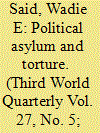|
|
|
Sort Order |
|
|
|
Items / Page
|
|
|
|
|
|
|
| Srl | Item |
| 1 |
ID:
074643


|
|
|
|
|
| Publication |
2006.
|
| Summary/Abstract |
This article examines generally the issue of whether deportation to a country that would almost assuredly torture the individual in question can ever be justified under international law, even when that individual is accused of having links to international terrorism. Specifically, this article provides an analysis of the legal responses of three major common law countries-the USA, Canada, and the UK-in assessing whether or not deportation under such circumstances is consistent with their obligations under international law, and argues that deportation where there is a credible threat of torture can never be countenanced.
|
|
|
|
|
|
|
|
|
|
|
|
|
|
|
|
| 2 |
ID:
080329


|
|
|
|
|
| Publication |
2007.
|
| Summary/Abstract |
The granting of political asylum is implicated in other often competing agendas and discourses, including national security, the obligation to provide safe haven, the histories of past immigrants and asylum seekers, and the criminalization of people who cross borders illegally, for whatever motive. Political asylum serves two sometimes contradictory ends: protection of the state and refuge for the applicant. This contradiction is at the root of the production of ignorance in a process that overtly seeks to generate knowledge. Restricted access to knowledge is part of persecution both as a form of control, and in the classification of knowledge as illicit, covert, or traitorous. We examine the conditions for producing knowledge and ignorance in the political asylum process in which the stories presented by applicants are evaluated by bureaucrats to determine whether they are credible and whether they meet the criteria of a well-founded fear of return to the homeland. We discuss narratives told by both asylum seekers in the United States and the United Kingdom and those who help them through the asylum process
|
|
|
|
|
|
|
|
|
|
|
|
|
|
|
|
| 3 |
ID:
138310


|
|
|
|
|
| Summary/Abstract |
This article examines the burst of airline hijacking that occurred from the U.S. to Cuba between 1968 and 1973. Attracted by Cuba s revolutionary mystique and seeking political asylum, sanctuary from racism, participation in Third World liberation movements, haven from criminal charges, and apolitical adventure, Americans hijacked more planes to Cuba during this period than all other global hijacking incidents combined. Constructing Cuba as an idealized imagined nation as an alternative to capitalism, white domination, and U.S. global hegemony and as a portal to Third World movements within the geopolitical context of the Cold War and decolonization, hijackers formulated themselves as beleaguered idealists and political refugees. Influencing U.S.-Cuba relations and resulting in an unprecedented diplomatic collaboration between the two nations to produce a mutual anti-hijacking agreement, the hijacking epidemic of 1968- 73 marks the unlikely meeting point where political protest movements, the African American freedom struggle, and U.S.-Cuba relations collided in the late 1960s.
|
|
|
|
|
|
|
|
|
|
|
|
|
|
|
|
|
|
|
|
|